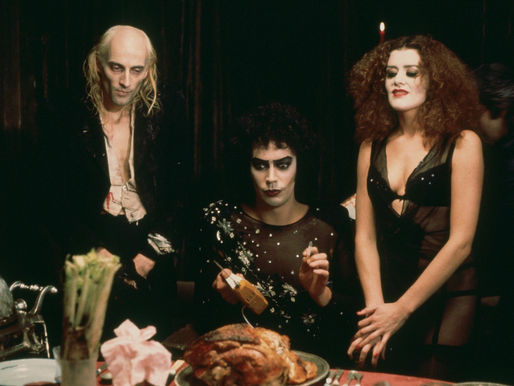top of page
Search
Film Reviews
Reviews of films from 1930's through to 1999.


It Happened One Night (1934)
Directed by Frank Capra and starring Clark Gable and Claudette Colbert, It Happened One Night is a landmark romantic comedy that set the blueprint for the genre.

Soames Inscker
4 min read


Annie Hall (1977)
Woody Allen’s 1977 masterpiece Annie Hall is a landmark in the history of romantic comedies, marking a definitive shift in the genre’s tone and narrative style. Winner of four Academy Awards — including Best Picture, Best Director, Best Original Screenplay, and Best Actress for Diane Keaton — the film represents Allen at his most innovative and introspective. Both a love story and a post mortem of a relationship, Annie Hall broke cinematic conventions while exploring the neur

Soames Inscker
4 min read


A Night at the Opera (1935)
A Night at the Opera is one of the Marx Brothers' most iconic and celebrated films, released in 1935 during Hollywood’s Golden Age. Directed by Sam Wood and produced by Irving Thalberg at MGM, the film marked a significant transition in the Marx Brothers' cinematic careers—from the anarchic free-for-alls of their earlier Paramount pictures to more structured narratives aimed at a broader audience.

Soames Inscker
4 min read


The Cannonball Run (1981)
The Cannonball Run is a film that thrives on energy, absurdity, and pure unadulterated fun. Directed by former stuntman Hal Needham, the movie is an ensemble comedy inspired by the real-life Cannonball Baker Sea-To-Shining-Sea Memorial Trophy Dash—an illegal cross-country car race conceived by automotive writer Brock Yates.

Soames Inscker
4 min read


The Fog (1980)
Following the enormous success of Halloween (1978), director John Carpenter and producer/co-writer Debra Hill returned with a more atmospheric and stylistic horror tale: The Fog. This 1980 film, drenched in gothic imagery and old-fashioned ghost story sensibilities, marked a shift from slasher horror to supernatural suspense. Though modestly received upon its release, The Fog has since garnered cult status and is now appreciated for its mood, music, and craftsmanship.

Soames Inscker
4 min read


"Hello, Dolly!" (1969)
“Hello, Dolly!” (1969) is a lavish, sprawling adaptation of the 1964 Broadway musical of the same name, which was itself based on Thornton Wilder’s play The Matchmaker. Directed by musical legend Gene Kelly and starring the inimitable Barbra Streisand in only her second film role, the movie exemplifies the final flourish of Hollywood’s golden era of big-budget musicals.

Soames Inscker
4 min read


The Odd Couple (1968)
The Odd Couple (1968) is one of those rare comedies that not only delivers enduring laughs but also taps into the human condition with surprising poignancy. Based on Neil Simon's smash Broadway play and brought to life on screen by the dynamic pairing of Jack Lemmon and Walter Matthau, the film remains a gold standard for character-driven humour.

Soames Inscker
4 min read


The Fall of the Roman Empire (1964)
The Fall of the Roman Empire is one of the grandest historical epics ever put to film—an ambitious, lavish, and intellectually inclined spectacle from director Anthony Mann. With sprawling sets, an ensemble of major stars, and a philosophical underpinning, the film sought to combine the grandeur of Ben-Hur with the gravitas of a Shakespearean tragedy.

Soames Inscker
4 min read


Murder By Death (1976)
Murder by Death is a genre-savvy spoof that brings together caricatures of the world’s most famous fictional detectives — thinly veiled versions of Hercule Poirot, Miss Marple, Sam Spade, and Charlie Chan, among others — and places them in a haunted mansion for a mysterious dinner party. The film was penned by the legendary playwright and screenwriter Neil Simon, known for his sharp wit and theatrical flair.

Soames Inscker
4 min read


The Return of the Pink Panther (1975)
After a decade away from the role, The Return of the Pink Panther marked the triumphant comeback of Peter Sellers as the bumbling, absurdly self-confident Inspector Jacques Clouseau. It was also a revival for the franchise itself, which had faltered slightly after the 1964 hit A Shot in the Dark and the Sellers-less 1968 film Inspector Clouseau.

Soames Inscker
4 min read


Tommy (1975)
Tommy is a surreal, audacious rock musical directed by the flamboyant British auteur Ken Russell, based on The Who’s 1969 concept album of the same name. The film is a psychedelic fever dream, built entirely around music and image rather than traditional dialogue or narrative structure. With its star-studded cast and genre-defying ambition, Tommy is both a product of its time and a lasting artifact of cinematic and musical experimentation.

Soames Inscker
4 min read


The Rocky Horror Picture Show (1975)
The Rocky Horror Picture Show is a transgressive, irreverent, and gloriously bizarre musical comedy-horror film that quickly outgrew its modest box office beginnings to become the ultimate cult classic. Based on the 1973 British stage musical by Richard O’Brien, the film is a madcap tribute to B-movies, sci-fi serials, glam rock, and sexual liberation.

Soames Inscker
4 min read


Monty Python and the Holy Grail (1975)
Monty Python and the Holy Grail is a comedic tour de force that turns the medieval legend of King Arthur into a gleefully absurd farce. Directed by two of the Monty Python troupe’s key members — Terry Gilliam and Terry Jones — and performed by the entire group in multiple roles, the film is a subversive, self-aware parody of chivalric myths, storytelling conventions, and historical epics.

Soames Inscker
4 min read


The Jungle Book (1967)
The Jungle Book (1967) is a vibrant, musically rich animated feature that holds a special place in the pantheon of Disney classics. It was the final animated film personally overseen by Walt Disney before his death in 1966, and his handprints are visible all over its tone, characters, and structure.

Soames Inscker
4 min read


Death Wish (1974)
Death Wish is a gritty and provocative film that became one of the most controversial movies of the 1970s. Directed by Michael Winner and starring Charles Bronson in his career-defining role, the film explores the psychological and moral transformation of a peaceful man into a lethal vigilante in response to personal tragedy and the unchecked crime in his city.

Soames Inscker
4 min read


The Taking of Pelham One Two Three (1974)
Set entirely within and around the labyrinthine subway system of 1970s New York City, The Taking of Pelham One Two Three is a high-concept heist thriller that delivers both pulse-pounding suspense and a wry, streetwise sense of humour.

Soames Inscker
4 min read


Earthquake (1974)
Earthquake (1974) was released at the peak of the 1970s disaster movie craze, a trend kicked off by Airport (1970) and further fuelled by The Poseidon Adventure (1972) and The Towering Inferno (also 1974). But Earthquake distinguished itself not only through its large-scale urban devastation but also through the innovative use of "Sensurround", a then-revolutionary theatre sound system designed to simulate the rumble of an actual quake.

Soames Inscker
4 min read


Young Frankenstein (1974)
Young Frankenstein is both a razor-sharp parody and a loving tribute to the classic Universal monster movies of the 1930s — particularly James Whale’s Frankenstein (1931) and Bride of Frankenstein (1935). Co-written by Gene Wilder and directed by Mel Brooks, the film is a rare feat: a comedy that manages to be wildly funny, visually sophisticated, and emotionally endearing all at once.

Soames Inscker
4 min read


Magnum Force (1973)
Magnum Force is the second instalment in the Dirty Harry film series and represents a significant tonal and thematic pivot from its controversial predecessor. While Dirty Harry (1971) presented a no-nonsense cop who bends the rules to catch criminals, Magnum Force questions the cost of crossing the line — by pitting Harry Callahan against a group of vigilante cops who go even further than he does.

Soames Inscker
4 min read


Serpico (1973)
Serpico is the gripping true story of Frank Serpico, a New York City police officer who exposed widespread corruption within the NYPD in the late 1960s and early 1970s. Directed by Sidney Lumet, a master of urban realism and moral inquiry, and anchored by a career-defining performance from Al Pacino, Serpico is more than a police procedural—it is a character study of a man who refuses to compromise in a system that punishes integrity.

Soames Inscker
4 min read
bottom of page


